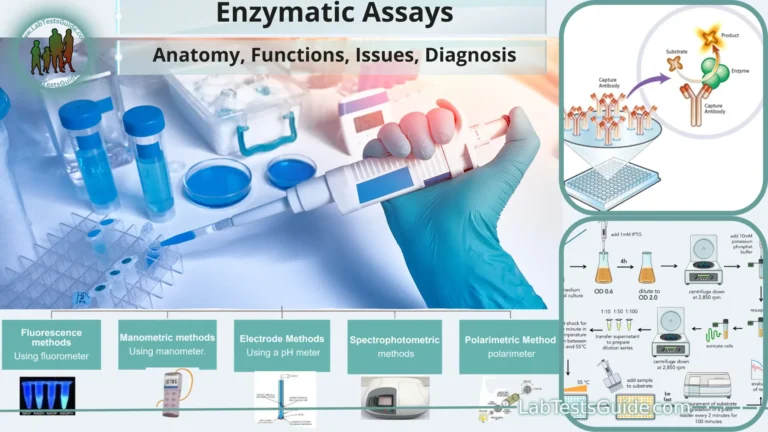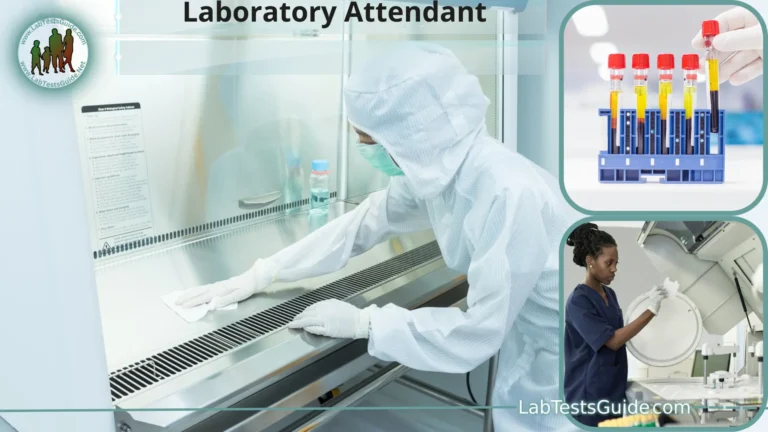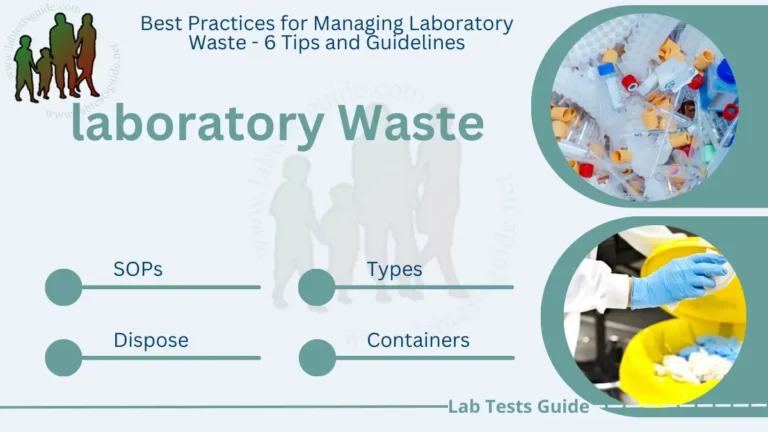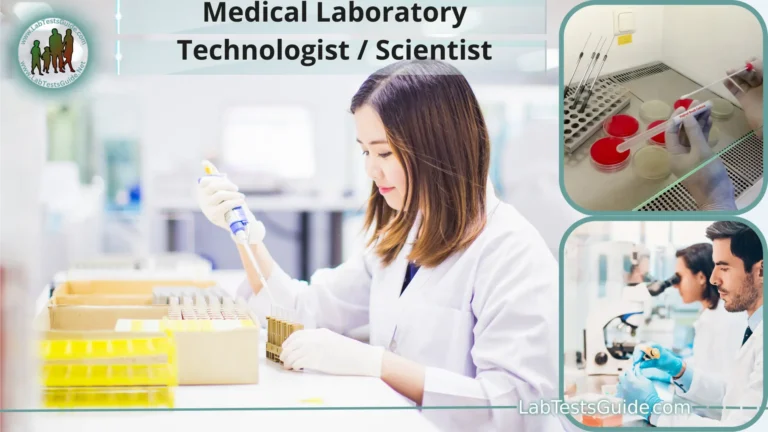A Medical Laboratory Technician (MLT) is a healthcare professional who plays a crucial role in the field of medical diagnostics. They are responsible for performing a wide range of laboratory tests and procedures on patient samples, such as blood, urine, tissue, and other bodily fluids. The primary goal of an MLT is to provide accurate and timely test results to assist doctors and other healthcare providers in diagnosing and treating medical conditions.
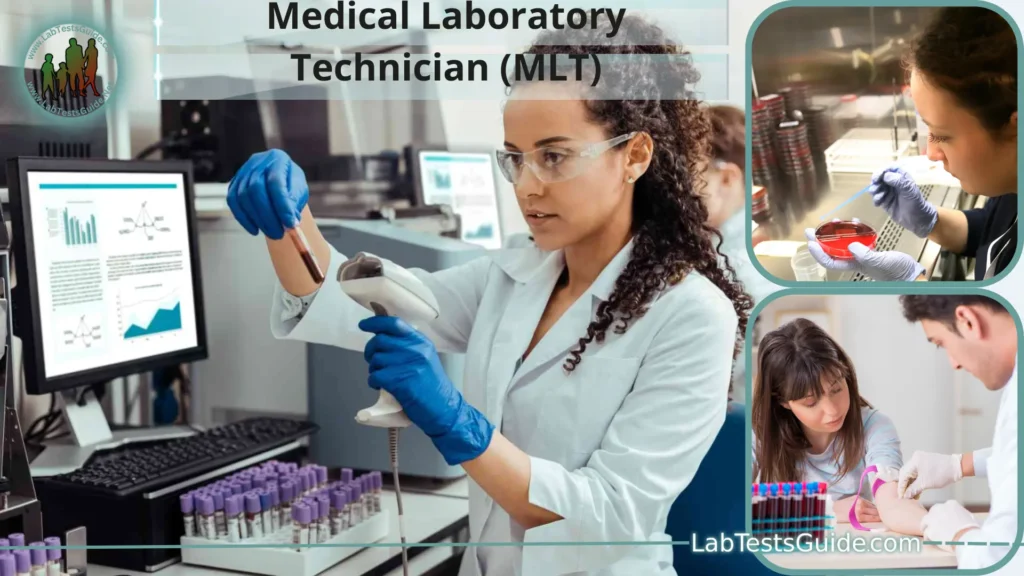
Discover the vital role of a Medical Laboratory Technician (MLT) in healthcare. MLTs perform precise diagnostic tests on patient samples, aiding in accurate diagnoses. Learn more about this essential healthcare profession today.
Career Prospects for Medical Laboratory Technician:
Career prospects for Medical Laboratory Technicians (MLTs) are generally positive due to the ongoing demand for healthcare services and the critical role they play in diagnostic medicine. Here are some key points about career prospects for MLTs:
- Steady Demand: MLTs are in demand across various healthcare settings, including hospitals, clinics, diagnostic laboratories, and research facilities. As the population continues to age and healthcare needs increase, the demand for MLTs remains stable.
- Job Growth: The U.S. Bureau of Labor Statistics (BLS) reports a positive outlook for MLT careers. In the United States, employment of medical laboratory technicians is projected to grow at a rate of 7% from 2020 to 2030, which is faster than the average for all occupations.
- Diverse Work Settings: MLTs have the flexibility to work in different healthcare environments, such as hospitals, private laboratories, blood banks, and public health agencies. This diversity of work settings allows for various career opportunities.
- Advancement Opportunities: MLTs can pursue career advancement by gaining experience and further education. Some may choose to become Medical Laboratory Technologists (MLTs) by earning a bachelor’s degree, which often comes with higher earning potential and more responsibilities.
- Specialization Options: MLTs can specialize in areas such as hematology, microbiology, immunology, or blood banking, which can lead to more specialized and higher-paying roles.
- Global Opportunities: The skills and knowledge of MLTs are transferrable, and there may be opportunities to work in healthcare settings around the world.
- Competitive Salaries: While salaries can vary by location and level of experience, MLTs typically earn competitive wages, and additional certifications or specialization can lead to higher earning potential.
- Job Security: The essential nature of MLT work in healthcare means that these professionals often enjoy job security.
- Technological Advancements: MLTs work with cutting-edge laboratory technology, which can make the profession appealing to those interested in the latest advancements in medical science.
- Continuing Education: Staying up-to-date with the latest developments in the field through continuing education is essential for career growth and remaining competitive in the job market.
Qualifications and Education:
Qualifications and education requirements to become a Medical Laboratory Technician (MLT) typically involve a combination of formal education and practical training. Here are the key qualifications and educational steps to pursue a career as an MLT:
- Educational Requirements:
- High School Diploma or Equivalent: To start a career as an MLT, you’ll need a high school diploma or a GED (General Educational Development) certificate. It’s important to take science and math courses during high school to build a strong foundation.
- Associate’s Degree: The most common educational path to become an MLT is to earn an Associate of Applied Science (AAS) degree in Medical Laboratory Technology from an accredited program. These programs are typically offered at community colleges, vocational schools, and some universities.
- Accredited MLT Program:
- Enroll in an accredited MLT program: Ensure that the program you choose is accredited by an appropriate accrediting body such as the National Accrediting Agency for Clinical Laboratory Sciences (NAACLS) in the United States. Accreditation ensures that the program meets established quality and educational standards.
- Complete coursework: MLT programs typically include classroom instruction, laboratory training, and clinical rotations. You’ll study subjects like clinical chemistry, hematology, microbiology, immunology, and laboratory management.
- Clinical Experience:
- Clinical Rotations: During your MLT program, you’ll complete clinical rotations at affiliated healthcare facilities. This hands-on experience is essential for gaining practical skills and exposure to real-world laboratory settings.
- Certification:
- Many countries, including the United States, require MLTs to be certified. Certification is often obtained through a national certifying agency such as the American Society for Clinical Pathology (ASCP) or equivalent organizations in other countries.
- Eligibility for certification typically involves completing an accredited MLT program and passing a certification exam. Different agencies may have specific requirements and exams, so it’s essential to research the requirements for your location.
- State Licensure:
- In some states or countries, MLTs may need to obtain a state license in addition to national certification. Check the specific requirements in your area.
- Continuing Education:
- To maintain certification and stay updated with advancements in the field, MLTs often need to complete continuing education courses and periodically recertify.
- Soft Skills:
- Effective communication, attention to detail, problem-solving abilities, and a commitment to maintaining a sterile and safe laboratory environment are crucial soft skills for success in this profession.
Specializations:
Medical Laboratory Technicians (MLTs) have the opportunity to specialize in various areas of clinical laboratory science, allowing them to focus on specific types of tests, patient populations, or medical conditions. Specializations in medical laboratory technology can enhance career prospects, provide deeper expertise, and potentially lead to advanced roles. Here are some common specializations for MLTs:
- Hematology: Hematology specialists focus on the analysis of blood samples to identify and diagnose disorders such as anemia, leukemia, and clotting disorders. They perform tests like complete blood counts (CBC) and blood coagulation studies.
- Microbiology: Microbiology specialists work with microorganisms like bacteria, viruses, and fungi. They identify and study pathogens responsible for infections and assist in prescribing appropriate antimicrobial treatments.
- Clinical Chemistry: Clinical chemistry specialists analyze chemical components in bodily fluids like blood and urine. They play a key role in monitoring organ function, diagnosing metabolic disorders, and managing chronic diseases.
- Immunology and Serology: Specialists in immunology and serology focus on the immune system’s response to diseases and infections. They perform tests to detect antibodies, antigens, and autoimmune disorders.
- Blood Banking (Immunohematology): Blood bank specialists are responsible for collecting, processing, and testing blood products for transfusions. They ensure the compatibility of donor blood with recipients, reducing the risk of transfusion reactions.
- Cytotechnology: Cytotechnologists specialize in examining cells and tissues for signs of cancer and other diseases. They work closely with pathologists to diagnose conditions based on cellular morphology.
- Molecular Diagnostics: This specialization involves using advanced techniques to study DNA and RNA for genetic disorders, infectious diseases, and cancer. Molecular technologists perform polymerase chain reaction (PCR) and DNA sequencing.
- Flow Cytometry: Flow cytometrists analyze cells using a laser-based technology to determine cell characteristics, including cell size, shape, and the presence of specific proteins. This is valuable in immunology, oncology, and research.
- Phlebotomy: While not a traditional MLT specialization, phlebotomists specialize in collecting blood samples from patients safely and efficiently. They play a crucial role in the initial step of laboratory testing.
- Point-of-Care Testing (POCT): POCT specialists work in healthcare settings where rapid test results are essential, such as emergency rooms and clinics. They perform tests like glucose monitoring, pregnancy tests, and blood gases.
- Quality Assurance and Laboratory Management: Professionals in this specialization focus on ensuring the accuracy, quality, and compliance of laboratory procedures and results. They may take on supervisory or managerial roles.
- Research and Development: Some MLTs transition to roles in research and development, where they contribute to the development of new laboratory tests, diagnostic technologies, and healthcare products.
Skills and Qualities:
To excel as a Medical Laboratory Technician (MLT), you need a combination of technical skills, interpersonal qualities, and professional attributes. Here’s a list of skills and qualities that are important for success in this profession:
Technical Skills:
- Laboratory Techniques: Proficiency in performing a wide range of laboratory tests, including sample preparation, analysis, and instrument operation.
- Sample Handling: Skill in collecting, handling, and processing various types of patient samples, ensuring accuracy and sample integrity.
- Instrumentation: Competence in operating and maintaining laboratory equipment and instruments, such as microscopes, centrifuges, analyzers, and automated systems.
- Data Analysis: Ability to interpret test results, identify abnormalities, and make accurate diagnoses based on laboratory findings.
- Quality Control: Knowledge of quality assurance and control processes to ensure accurate and reliable test results.
- Clinical Knowledge: Understanding of human anatomy, physiology, and pathology to contextualize laboratory findings and assist in diagnoses.
- Safety Protocols: Adherence to strict safety protocols, including proper handling of biohazardous materials and maintaining a sterile laboratory environment.
- Computer Proficiency: Familiarity with laboratory information systems (LIS), data entry, and software for result reporting and data analysis.
Interpersonal and Communication Skills:
- Attention to Detail: Meticulousness in recording and analyzing data, as even small errors can have significant consequences in medical diagnostics.
- Communication: Effective communication with healthcare providers, colleagues, and patients to discuss test results, answer questions, and convey critical information.
- Teamwork: Collaborative approach to work within a multidisciplinary healthcare team, including pathologists, nurses, and other laboratory staff.
- Patient Interaction: Compassion and professionalism when interacting with patients during sample collection or when explaining procedures and test results.
- Problem-Solving: The ability to troubleshoot instrument issues, unexpected results, and other challenges that may arise in the laboratory.
Qualities and Attributes:
- Ethical Conduct: High ethical standards and a commitment to patient confidentiality, privacy, and the highest level of professional integrity.
- Adaptability: Flexibility to handle a variety of laboratory tests and adapt to changes in technology, procedures, and regulations.
- Time Management: Efficient use of time and prioritization of tasks to meet tight deadlines and ensure timely reporting of results.
- Stress Management: The ability to work calmly and effectively under pressure, especially during emergencies or high-volume periods.
- Critical Thinking: The capacity to analyze complex problems, evaluate options, and make informed decisions to optimize patient care.
- Continuous Learning: A commitment to staying updated with advances in laboratory technology and medical science through ongoing education and professional development.
- Professionalism: Demonstrating a strong work ethic, responsibility, and a commitment to maintaining a high standard of patient care.
- Detail-Oriented: A keen eye for detail, precision, and accuracy in all aspects of laboratory work to ensure reliable results.
Job Description / Responsibilities:
- Sample Collection: Collect and label patient samples, ensuring accurate identification and proper documentation.
- Laboratory Testing: Perform a wide range of laboratory tests on patient samples following established protocols.
- Quality Control: Conduct quality control procedures to ensure accurate and reliable test results.
- Equipment Operation: Operate and maintain laboratory equipment and instruments, troubleshoot issues, and perform routine maintenance.
- Results Interpretation: Analyze test results, interpret findings, and report abnormal or critical values.
- Patient Diagnosis: Assist in diagnosing and monitoring medical conditions by providing accurate laboratory data.
- Safety Compliance: Follow strict safety protocols to maintain a sterile and safe laboratory environment.
- Collaboration: Collaborate with healthcare professionals to discuss test results and patient care plans.
- Blood Typing: Perform blood typing and cross-matching for blood transfusions.
- Microbiological Testing: Conduct microbiological testing to identify microorganisms.
- Tissue Preparation: Prepare and stain tissue samples for microscopic examination.
- Coagulation Studies: Perform coagulation studies to assess blood clotting disorders.
- Hematology Analysis: Evaluate complete blood counts (CBC) to detect blood-related conditions.
- Chemical Analysis: Analyze chemical components in blood and urine to assess organ function and diagnose metabolic disorders.
- Molecular Techniques: Use PCR and molecular techniques to detect genetic diseases and infectious agents.
- Cytology Examination: Examine cells for signs of cancer and assist with bone marrow procedures.
- Inventory Management: Monitor and maintain laboratory supplies and reagents.
- Patient Education: Educate patients on proper specimen collection procedures when needed.
- Research Support: Participate in research projects and clinical trials.
- Record Keeping: Maintain accurate records of laboratory procedures, test results, and patient information.
- Ethical Standards: Adhere to ethical and privacy standards, safeguarding patient confidentiality.
- Continuing Education: Stay up-to-date with the latest advances in laboratory technology and methods.
- Training and Supervision: Assist in training and supervising laboratory assistants and phlebotomists.
- Efficiency: Work efficiently and prioritize tasks to meet tight deadlines.
- Emergency Response: Handle emergency situations with composure and accuracy, ensuring timely results.
Possible References Used


